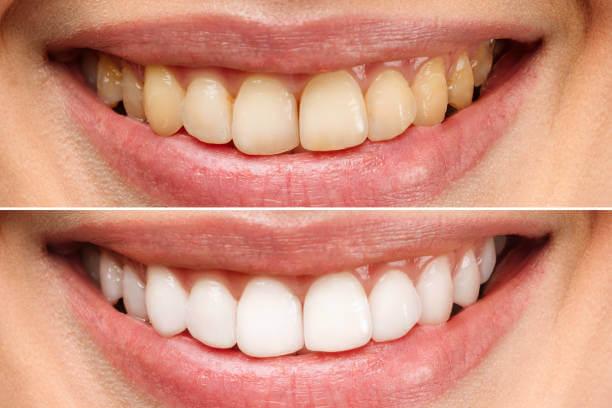
Who doesn’t love the confidence that comes with a bright, radiant smile? Teeth whitening has become one of the most sought-after cosmetic dental treatments for good reason. But one burning question often arises: how long does teeth whitening last?
Charlotte Emergency Dental is here to explore everything about teeth whitening longevity, including factors that influence results, types of treatments, and ways to make your brightness last.
Teeth whitening works through a chemical process where whitening agents break down stains on the enamel.
The most common ingredients in whitening products are hydrogen peroxide and carbamide peroxide. These ingredients help to break up and remove stains, making your teeth appear brighter and whiter.
Several factors influence how long your whitening results stay intact, including daily habits, the whitening method you choose, and even your age.
Your day-to-day activities play a significant role in maintaining your results.
Love sipping on coffee, tea, or red wine? These beverages can gradually dull your shine. Smoking is another major offender, leaving stubborn stains on your teeth.
Dentists recommend scheduling routine cleanings to keep your smile vibrant.
Not all whitening treatments are created equal. Professional whitening lasts longer than at-home kits or over-the-counter products because the formulas used are stronger and more effective.
Here’s why professional treatments outshine others:
With our professional whitening services at Charlotte Emergency Dental, you can trust that your results will be both stunning and long-lasting.
When it comes to teeth whitening, the method you choose significantly impacts the longevity of your results. Here are key points to consider when comparing whitening methods:
Choosing the best method depends on your goals, budget, and how long you want your results to last.
For the longest-lasting results, professional whitening offers a safe and effective solution that delivers stunning, consistent results.
Age plays a role in both the appearance and durability of your whitening results. As we get older, our enamel naturally thins, making our teeth more prone to discoloration.
As you age, your enamel wears down, and the underlying dentin becomes more visible. This makes your teeth appear darker or more yellow, which affects how well whitening treatments can work.
Additionally, accumulated stains from food, drinks, and tobacco use can affect the overall effectiveness of whitening procedures.
Whitening treatments for older patients may need to be customized to account for enamel thinning and other factors. A skilled dentist will tailor whitening methods to each patient’s unique needs to provide the best possible results.
Some people naturally have thicker enamel, making their teeth more resistant to staining. Others may have intrinsic discoloration that’s harder to treat.
This is where professional evaluation becomes crucial. Your dentist will assess your teeth's unique characteristics to recommend the most effective whitening options for you.
The saying “you are what you eat” applies to your teeth too. Certain foods can either enhance or detract from your whitening results.
Small dietary adjustments can make a big difference in preserving your smile’s brightness.
One common concern for people considering teeth whitening treatments is tooth sensitivity.
While some minor discomfort during or after the whitening procedure is normal, it’s important to understand when sensitivity becomes a problem and how to manage it.
Teeth whitening works by breaking down stains within the enamel, but this process can temporarily increase tooth sensitivity.
The active ingredients in whitening products—usually hydrogen peroxide or carbamide peroxide—can penetrate the enamel and reach the dentin layer, causing some irritation to the nerves in your teeth.
Sensitivity during or after whitening is most often short-lived and should subside within a few hours to a few days. However, some individuals may experience heightened sensitivity, particularly if they already have thin enamel or have exposed roots.
While mild sensitivity to hot or cold is usually temporary, it’s essential to keep an eye on how your teeth are reacting to the treatment. If tooth sensitivity persists for more than a few days or worsens over time, it's crucial to contact your dentist immediately.
Prolonged or intense sensitivity could be a sign of an underlying issue, such as enamel damage, gum recession, or an allergic reaction to the whitening products.
Good oral hygiene is your best defense against discoloration and a key to prolonging whitening results.
Routine cleanings will also help maintain your smile’s brilliance by removing surface stains and polishing your teeth.

Even with the best care, teeth whitening isn’t permanent. Touch-up treatments can refresh your smile and extend the longevity of your results.
When it comes to achieving and maintaining a brighter smile, professional care makes all the difference. At Charlotte Emergency Dental, we pride ourselves on offering advanced solutions tailored to each patient’s needs.
We go beyond whitening, providing a wide range of dental services for residents of Charlotte, NC, and surrounding areas. We’re here to help you achieve a healthy, radiant smile.
Teeth whitening can be transformative, but its longevity depends on your habits, the treatment type, and regular maintenance.
By choosing professional care at Charlotte Emergency Dental, you’re investing in results that last—and a team that prioritizes your oral health.
Ready to enhance and maintain your bright smile? Reach out to Charlotte Emergency Dental today to schedule your appointment!

We have temporarily updated our hours, reflected below.
MONDAY to FRIDAY
9:00am – 7:00pm
SATURDAY to SUNDAY
9:00am – 3:00pm
Save time, print online! Fill out forms online before your first visit to shorten your appointment time with us.